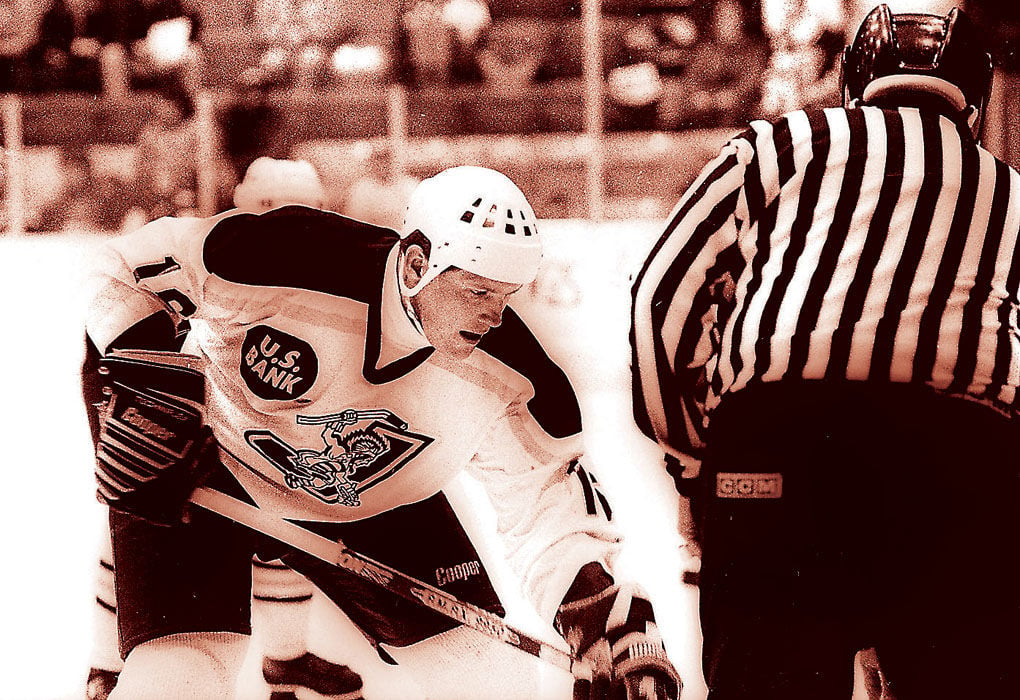Minor league greats: Trevor Jobe
 |
| Trevor Jobe prepares to take a faceoff while playing for the Johnstown Chiefs. Credit: The Tribune Democrat |
For many hockey fans, the 1992-93 season is seen as the best
in NHL history.
A look through the scoring leaders from that year show
almost inconceivable numbers in the modern game. For comparison, Nikita
Kucherov’s 128-point season last year, which put him 11 points ahead of the
runner up in the scoring race, Connor McDavid, would’ve placed him 7th
amongst scoring leaders in 1993. With 160 points on the year, Mario Lemieux
captured the art ross trophy, and five players finished the season with 60
goals over more.
Wayne Gretzky had 40 points in 24 games in the playoffs, and
the Montreal Canadiens reeled off 11 straight OT wins en route to winning the
Stanley Cup. However, while all that is very impressive, a lot of people forget
what happened in the minor leagues that year. As weird as it might seem, they
were also a lot of record-breaking performances in the AHL too. Binghamton
Rangers forward Don Biggs finished the season with 138 points (still an AHL
record) and Cape Breton’s Oilers forward Bill McDougall smashed all AHL playoff
scoring records, recording an astonishing 52 points in 16 games.
Yet, more impressive still, is what happened in the ECHL.
Cue, Trevor Jobe.
To me, there aren’t many careers in hockey as bizarre and
winding as this. A native of Brandon, Manitoba, Jobe career’s lasted from 1988
to 2005, and spanned numerous different leagues across numerous different skill
levels. In between it all, he managed to sneak in 81 AHL games, recording 52
points. From Knoxville Tennessee to Ljubljana, Slovenia, Jobe’s career is a
road map to say the least. However, that’s not to say it wasn’t successful.
With 635 points in 335 games, Jobe is the 4th all time leading
scorer in ECHL history, and his 608 career goals are the 8th highest
in minor league hockey history.
 |
| Jobe with the Richmond Renegades. Credit: Beckett sports collectibles |
A prolific scorer in junior with the Moose Jaw Warriors of
the WHL, Jobe was drafted 133rd overall by the Toronto Maple Leafs in 1987.
After a season with their farm team in Newmarket (his only full AHL season) the
team sent him down to the ECHL, where he would spend the next 2 years, before
they fully cut ties with him. By 1992-93, Jobe found himself playing for the
Nashville Knights, and it was here where he showed just how skilled he could
be.
In 61 games that year, Jobe recorded 85 goals and 76
assists, for 161 points, an ECHL record which still stands and will most likely
never be broken. He solely led the league in goals, points, powerplay goals
(24) shots (331) and hat tricks (12), recording back to back ones on October 20th
and 21st. On December 10th, Jobe was recalled by the New
Haven Senators, who were struggling at the time and in need of a scoring punch.
After 3 games though, Jobe was returned to Nashville, and from there would
start an 86-game point streak, lasting from December 19th, 1992 to
March 14th, 1993. Over that 38-game span, Jobe recorded 112 points,
unprecedented numbers even back then.
Despite this, Jobe would only get one more shot at the
higher leagues, spending 10 games with the Atlanta Knights of the IHL,
recording 7 points. Now, I bet a lot of you are thinking, what happened? How
did this guy end up in the ECHL? Was he just a talented ECHL scorer? Well, not
necessarily.
In January of 2012, a small thread was started on the Hockey
Forum boards about Jobe. In it, a Mr. FerrisRox spoke to then Leafs GM Gord
Stellick, who said that Jobe was a not only going to make the Leafs but be a
key young player with the team. However, then the problems started. Thing is,
it wasn’t his skills that kept Jobe out of the NHL,
it was alcohol.
Despite posting excellent numbers in junior, Jobe had
garnered a reputation as a bit of a party animal, which is why he was taking so
late in the draft. These issues would plague his entire career, as Jobe simply
didn’t put everything into hockey. He was suspended from teams’ multiple times
for DUI’s and under offenses, would often just quit on teams only to be picked
up somewhere else, and was simply put, a purely offensive player. As amazing as
Jobe’s offensive totals are, one look at his plus minus tells both sides of the
coin. In 1997-98, with the Tuscon Gila Monsters of the CHL, Jobe was -34 while
recording 29 points in 23 games.
 |
| Jobe with the Newmarket Saints. Credit: Amazon.ca |
On December 30th, 1998, a drunken Jobe was behind
the wheel in an early morning car wreck while playing for the Columbus
Cottonmouths. As well, he was found to not have a driver’s license. Rather than
put the effort in to become an NHL star, Jobe was more satisfied with drinking
and lighting up the minor leagues. He was out of shape, never played defense,
and had a me first ideology when it came to his play, rightly deserved in some
respects, but still not a good quality to have.
Jobe retired after the 2004-2005 lockout season, playing 17
games for the Winston Salem Polar Bears. Today, Jobe simply lives on as a
footnote in hockey history, and a curious point of reference to any person
casually browsing IHDB. Simply put, Jobe had all the offensive tools, but none
of the drive, a disappointing finish, for one of the greatest minor league
players.
Find me on Twitter @9secondsot
Comments
Post a Comment